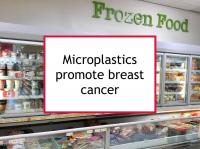Recent news concerning microplastics (plastic fragments < 5 mm) have heightened awareness of this widespread contaminant. For example, microplastics have been found to be prevalent in water packaged in plastic bottles, as well as in chewing gum, and they appear to accumulate in the brain. Now a new study has reported that polystyrene-derived microplastics promote breast cancer.
Leaching of microplastics
Polystyrene is used frequently in food packaging, including containers, plates, bowls, and coffee cups, in both rigid plastic and Styrofoam forms. Polystyrene-derived microplastics can leach from food containers and enter food. This is particularly true when polystyrene containers (1) are subjected to high temperatures (such as those used in microwaving); (2) are used for frozen food; (3) contain foods with high fat content; or (4) are heated repeatedly.
While the study referenced above concerns polystyrene-derived microplastics, other studies have demonstrated cancer-promoting effects due to additional types of plastic. Note that some plastics incorporate the breast carcinogens bisphenol A (BPA) or phthalates, which are also found in their microplastics.
Latest research finds microplastics promote proliferation
The present study was designed to investigate the effects of polystyrene-derived microplastics (PS-microplastics) in breast cancer cells. PS-microplastics previously have been shown to have estrogenic effects in aquatic organisms. This suggests that they may act as an endocrine-disrupting chemical, therefore as a risk factor for estrogen-driven diseases, among them breast cancer.
To conduct the study, the authors exposed ER+ (MCF-7) and ER- (MDA-MB-231) breast cancer cells to both low and high concentrations of PS-microplastics for four weeks. PS-microplastics exposure significantly increased the viability of ER+ cells, while not affecting ER- cells. Further experimentation demonstrated that PS-microplastics significantly increased ER signaling pathways and tumor growth in mice. In addition, ER-knockdown MCF-7 cells were not affected by PS-microplastics exposure. The authors conclude that exposure to PS-microplastics promotes the malignant transformation of human breast cancer cells through the estrogen signaling pathway.
